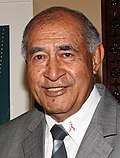Description of the office
Like other ministers, the Foreign Minister is formally appointed by the President on the nomination of the Prime Minister, and is responsible to both the Prime Minister and the Parliament. The position may be held independently, or in conjunction with other ministerial responsibilities. From time to time, the Prime Minister has simultaneously served as Foreign Minister.
Along with all ministers, the Foreign Minister is constitutionally required to be a member of the Parliament.
This page is based on this
Wikipedia article Text is available under the
CC BY-SA 4.0 license; additional terms may apply.
Images, videos and audio are available under their respective licenses.
















